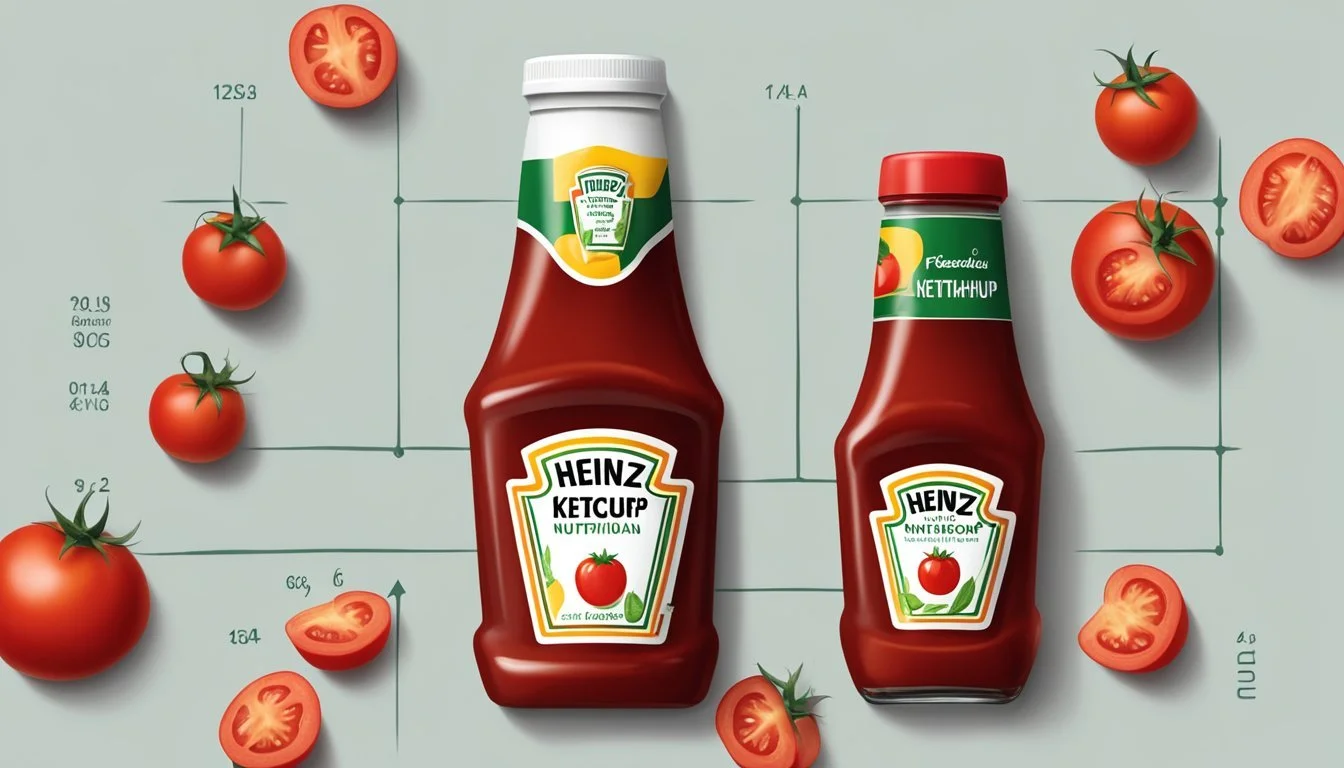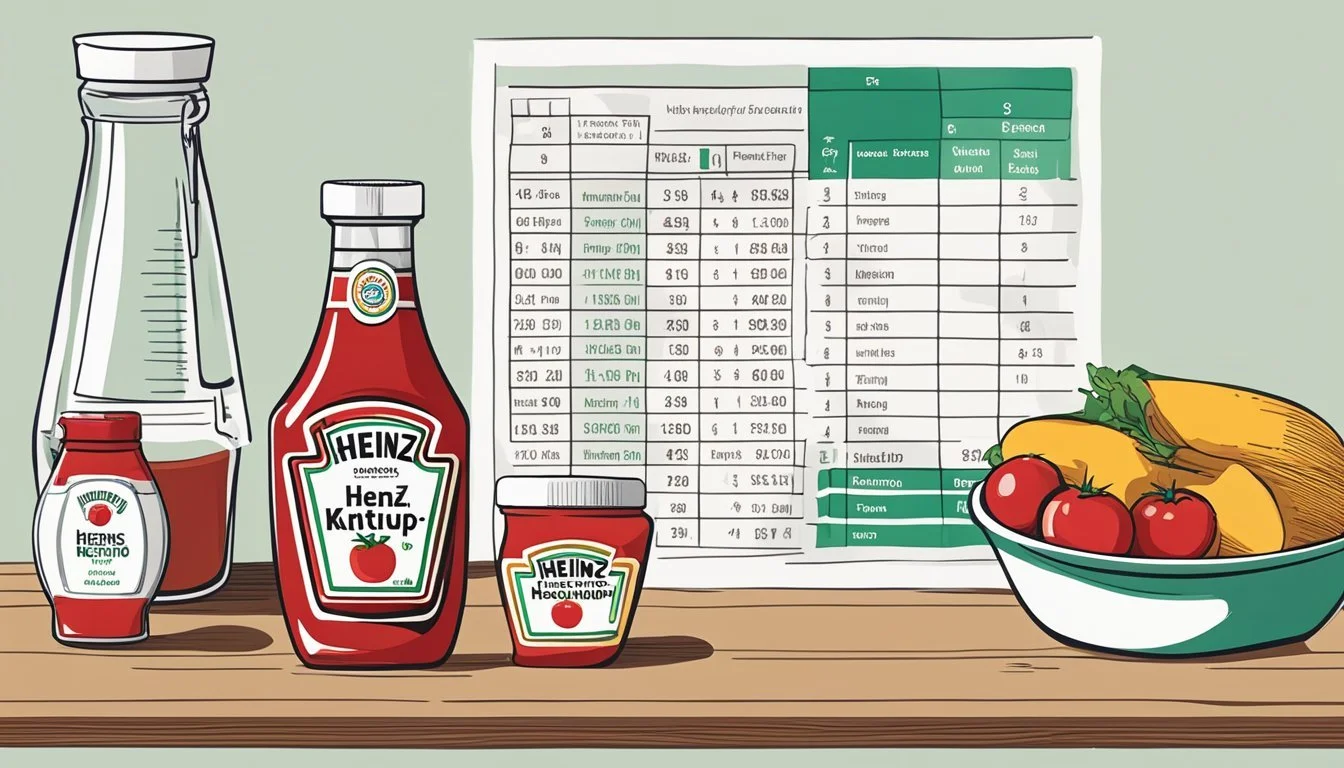How Much Heinz Ketchup Per Day Is Too Much?
Understanding Dietary Limits
Heinz Ketchup is a staple condiment in many households, renowned for its distinctive flavor that complements a range of foods. As a product of the Heinz brand, it is synonymous with quality and has been a part of culinary traditions for generations. However, with growing awareness about the importance of a balanced diet and the impact of sugar intake on health, questions arise about the appropriate quantity of ketchup that can be consumed without negative health consequences.
The sugar content in Heinz Ketchup has been the subject of scrutiny. With a typical bottle listing approximately 4 grams of sugar per tablespoon, consumers need to be vigilant about their overall consumption. Considering that dietary guidelines suggest limiting added sugars, it becomes essential to understand how much Heinz Ketchup one might safely include in their daily diet without exceeding recommended sugar intake levels.
It is crucial for individuals to consider not only taste but also nutritional information when including Heinz Ketchup in their meals. Evaluating the sugar content per serving against other ingredients and the total daily consumption can help in making informed choices. Maintaining a balanced approach to condiments will assist consumers in enjoying the flavors they love while adhering to a health-conscious diet.
Ketchup Composition and Nutritional Information
Heinz ketchup is a widely used condiment with specific nutritional components. This section breaks down its ingredients, macronutrient profile, and micronutrients.
Ingredients Overview
The primary Ingredients in Heinz ketchup include tomato concentrate from red ripe tomatoes, distilled vinegar, high fructose corn syrup, corn syrup, and salt. Other ingredients are spice, onion powder, garlic powder, and natural flavoring.
Macronutrients Profile
Per serving, Heinz ketchup contains a modest calorie count and a sugar content that requires attention when considering daily consumption limits.
Macronutrient Amount per Serving Calories 15 - 20 Sugar 2 - 4 grams Fat 0 grams Protein 0 grams Carbs 4 - 5 grams Fiber Less than 1 gram
Micronutrients and Additives
While not a significant source of vitamins or minerals, Heinz ketchup can contribute sodium to one's diet, with amounts around 95 to 160 milligrams per serving or 4% to 7% of the Daily Value. It's notable that there's an absence of fat, cholesterol, and protein.
Health Considerations of Ketchup Consumption
Ketchup, a common condiment in many households, contains ingredients that could impact health when consumed in excessive amounts. This section explores its potential effects on weight gain, heart health, blood sugar, blood pressure, and identifies some benefits and risks.
Role in Weight Gain and Heart Disease
Ketchup often contains sugar or high fructose corn syrup, which can contribute to weight gain if consumed in large quantities. Regularly including high-sugar condiments in the diet can also lead to increased calorie intake. The American Heart Association suggests that added sugars should be limited to avoid the risk of heart disease. High consumption of sugars is linked with higher cholesterol levels, promoting atherosclerosis, which is a risk factor for heart disease.
Nutrient Consideration for Heart Health Added Sugar Can contribute to weight gain and high cholesterol levels High Fructose Corn Syrup Associated with obesity and related heart disease risk factors
Impact on Blood Sugar and Blood Pressure
The high sugar content in ketchup can influence blood sugar levels, potentially causing them to spike, which is a concern for individuals with diabetes. Excess intake of ketchup can also lead to higher consumption of sodium, a key factor in high blood pressure.
Component Impact Sugar May cause blood sugar spikes Sodium Contributes to high blood pressure risks
Potential Benefits
Despite its high sugar content, ketchup contains lycopene, an antioxidant found in tomatoes which has been studied for its potential to reduce inflammation and the risk of prostate cancer.
Lycopene: Antioxidant with potential health benefits.
Tomatoes: Base ingredient providing vitamins and minerals.
Risks Associated with Overconsumption
Consistent overconsumption of ketchup may increase risks of tooth decay, heartburn, or worsen conditions like cancer and allergies due to high levels of sugars and additives. Fructose, especially in the form of high fructose corn syrup, can be hard to metabolize in large amounts, potentially leading to liver issues and increased obesity risk.
Risk Associated Condition High Fructose Linked to liver issues and obesity Added Sugars May lead to tooth decay and heartburn Preservatives Potential trigger for allergies
Ketchup in the American Diet
Heinz ketchup is a staple condiment in many American households, often accompanied by a variety of foods, reflecting its deep-rooted presence in the cultural fabric of America. It's a ubiquitous aspect of the American diet, notable for its contribution of sugar, salt, and taste to meals.
Popular Food Pairings
In America, Heinz ketchup is frequently paired with a variety of foods. The most common of these include:
Fries: A classic American side dish, often enjoyed with a generous squeeze of ketchup.
Burgers: Many Americans adorn their burgers with ketchup, alongside other condiments and toppings.
Recipes: Ketchup serves as a key ingredient in numerous recipes, from meatloaf glazes to barbecue sauces.
Given its popularity, ketchup is involved in many American meal traditions, with a particular affinity for fast food and casual dining experiences.
Cultural Significance of Heinz
The presence of Heinz ketchup in America extends beyond mere consumption. It represents:
Brand Recognition: Heinz is recognized as the leading ketchup brand, with its distinctive bottle being an iconic image in American dining culture.
Market Dominance: Statistics show that an overwhelming majority of American households reportedly keep a bottle of Heinz ketchup in their refrigerator.
The sheer volume of Heinz ketchup consumption in America underscores its cultural importance, reinforcing its status as a familiar and comforting presence in the American diet. Heinz has influenced food preferences and eating habits, becoming almost synonymous with the idea of ketchup in America.
Recommended Daily Intake
In considering the daily intake of Heinz ketchup, one must be aware of its sugar and sodium content relative to dietary guidelines. Moderation is key to incorporating ketchup into a balanced diet.
Official Dietary Guidelines
The American Heart Association (AHA) recommends limiting added sugars to no more than 36 grams (9 teaspoons) for men and 25 grams (6 teaspoons) for women per day. As for sodium, the AHA advises no more than 2,300 milligrams a day and moving toward an ideal limit of no more than 1,500 mg per day for most adults.
Regarding ketchup, the nutritional facts of Heinz state that one tablespoon contains about 4 grams of sugar and 160 milligrams of sodium. These values are significant, especially when considering the ease with which one can exceed a single serving size.
Practical Tips for Moderation
When incorporating ketchup into a diet, individuals should:
Track servings: One serving of ketchup is typically about one tablespoon. Be vigilant in measuring to avoid overconsumption.
Read labels: Look at nutrition facts to be informed about the sugar and salt content of each serving.
Balance diet: If ketchup is consumed during a meal, adjust other foods to ensure the overall dietary intake of sugar and salt remains within recommended limits.
Seek alternatives: For those needing to significantly reduce sugar and salt intake, consider low-sodium or no-added-sugar ketchup as an alternative.
Heinz Ketchup Alternatives
Consumers looking to reduce sugar intake or seeking organic ingredients have viable alternatives to traditional Heinz ketchup. These options cater to the growing demand for healthier condiments without sacrificing flavor.
Low-Sugar and Organic Options
Low-Sugar Varieties: For those monitoring sugar consumption, options such as Heinz's own 50% Less Sugar and Salt ketchup provide a familiar taste with reduced sugar content. Per 15g serving, this alternative contains only 1.7g of sugar. Additionally, brands like True Made Foods offer ketchup varieties with lower sugar levels, using vegetables like carrots and butternut squash for natural sweetness.
Organic Ingredients: Organic ketchups are available for those seeking products without synthetic fertilizers or pesticides. Companies like Annie's Homegrown produce organic ketchups that prioritize natural ingredients and provide full nutrition information on their labels.
Homemade Recipes
Homemade Ketchup: Creating homemade ketchup allows complete control over the ingredients and nutritional content. A basic recipe may include:
Fresh tomatoes
Vinegar
Sweeteners like honey or maple syrup (in moderation for lower sugar content)
Spices such as onion powder, garlic powder, and allspice
Recipes can vary, but a standard approach involves blending the fresh tomatoes and simmering the mixture with the rest of the ingredients to achieve the desired consistency and flavor.
By exploring low-sugar commercial varieties or crafting organic, homemade ketchup, individuals have the autonomy to enjoy this staple condiment in a way that aligns with their nutritional preferences.
Consumer Information
This section focuses on the importance of understanding nutrition information specific to Heinz Ketchup and how to access comprehensive brand resources effectively.
Label Reading and Understanding Nutrition Information
When examining a Heinz Ketchup bottle, consumers will notice that the nutrition label clearly states the amount of sugar per serving. A typical serving size is one tablespoon (17 grams), which contains about 4 grams of added sugar. This is crucial information, as monitoring sugar intake is essential for maintaining a healthy diet. High consumption of added sugars can lead to various health issues.
Heinz Ketchup is known for its sweetness, which is partly due to the inclusion of high fructose corn syrup. Maple Media LLC and similar entities, as Amazon Associates, often provide additional nutritional breakdowns and analyses on their platforms, thereby enabling consumers to make more informed decisions.
Navigating Heinz Brand Resources
Heinz provides various resources to assist consumers in making educated choices about their products. The official Heinz website features a comprehensive FAQ section, where one can find answers to common questions about their products. Further brand information can be assessed via Heinz's social media profiles on Facebook, Twitter, Instagram, and Pinterest.
Moreover, the Heinz Ketchup brand often promotes its products through mobile applications, which can be downloaded via app stores. These apps may offer detailed product information, recipes, and even nutrition tips. For consumers looking to connect directly with the brand or seek customer support, these digital platforms are an integral resource.
Corporate and Environmental Responsibility
This section explores the strides Heinz is taking in its commitment to corporate and environmental responsibility, focusing on their sustainable practices and community support initiatives.
Sustainability Practices
Heinz aims to achieve net zero carbon emissions by 2050, with an interim goal of halving emissions by 2030. A key component of their sustainable practices includes:
Sustainable Agriculture: Heinz has made significant progress in sustainable sourcing, with 75% of its HEINZ ketchup tomatoes sustainably sourced in line with the company's Sustainable Agricultural Practices Manual.
Energy Use: The goal is to reduce energy use intensity by 15% across manufacturing facilities by 2025.
Renewable Electricity: The company is working to procure the majority of its electricity from renewable sources by 2025, with a current achievement of 14.21%.
Water Use: They plan to reduce water use intensity by 20% in high-risk watershed areas.
Community Support Initiatives
Heinz demonstrates corporate social responsibility through community support initiatives that prioritize both human welfare and the environment. Highlights include:
Recycling Innovations: Heinz has introduced a recyclable solution for its tomato ketchup squeeze bottle, with the new bottle planned to be rolled out globally, emphasizing environmental stewardship.
Animal Welfare: The company has met its goal to exclusively purchase free-range eggs, reflecting its commitment to ethical animal welfare practices.
Customer Support and Interaction
Heinz values engagement with its customers, ensuring support is readily available, and emphasizes the safeguarding of user data through robust privacy management.
Accessibility and User Support
Heinz offers comprehensive customer support to provide users with information regarding their products, including Heinz Ketchup. Users can access support through multiple channels, such as phone lines, email, or live chat support which are highlighted in the company's Terms of Service. For an enhanced user experience, provision for individuals requiring accessibility features, like high contrast settings, is made through their website and app download options.
Support Channels:
Phone
Email
Live chat
Accessibility Features:
High contrast website options
Voice-over support
Privacy and Data Management
Heinz's Privacy Policy strictly adheres to contemporary data protection standards and clarifies how personal information is gathered, used, and protected. They allow users to manage cookies and opt-out of certain types of data collection, ensuring that personal preferences regarding privacy can be tailored to individual needs.
Key Privacy Points:
Transparent data collection methods
Options to manage cookies
Secure personal information handling processes
Legal and Affiliate Information
This section delineates the legal bindings and affiliate disclosures relevant to Heinz Ketchup consumption advisories. Maple Media LLC ensures compliance with copyright law and adheres to Terms of Service that protect both the provider and the user.
Terms of Service Overview
Maple Media LLC operates under a specific Terms of Service (ToS) agreement that users must accept prior to accessing content or services. This ToS outlines permissible use of content, disclaimers of liability, and the company's rights to modify or discontinue service. It is imperative that users read and understand these terms to ensure they are using the service within legal boundaries.
Affiliate Program Details
As part of its revenue model, Maple Media LLC may participate in the Amazon Associate program, an affiliate advertising initiative designed to provide a means for sites to earn advertising fees by advertising and linking to Amazon.com. Under this program, when a user makes a Qualifying Purchase through provided affiliate links, Maple Media LLC may receive a commission. This does not affect the purchase price and helps to support the company's efforts in delivering quality content.
Amazon Associate: Maple Media LLC
Qualifying Purchases: Items bought through affiliate links
Commission: Earned on purchases made via affiliate links










